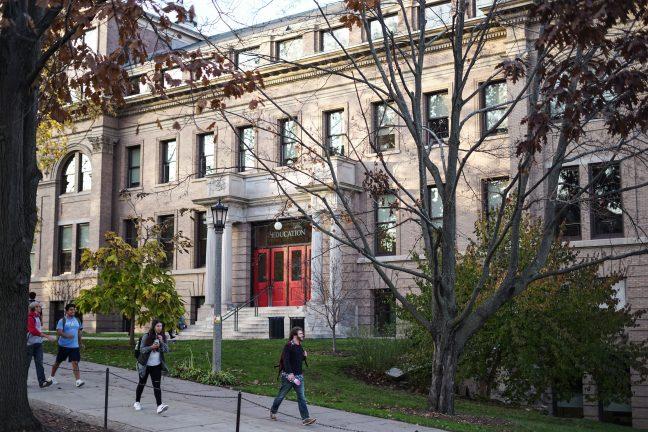In 2010, the University of Wisconsin’s School of Education partnered with the College of Letters & Sciences to start the Greater Madison Writing Project in affiliation with the National Writing Project.
By starting this project, UW joined a national network of about 175 other writing project sites — all of which are housed at universities, according to GMWP co-directors Bryn Orum and Mark Dziedzic.
With the primary goal of boosting writing education in Wisconsin classrooms, UW partners collaborated with K-12 educators to operate the GMWP, Dziedzic said.
To do this, the GMWP places teachers at the center of writing education, offering both year-long and summer professional development institutes for teachers, Orum said.
“It’s about teachers teaching other teachers,” Orum said. “We are just creating the conditions for that to take place.”
At the institutes, educators from across Wisconsin collaborate with one another — working, writing, researching and sharing their practices in the teaching of writing with one another, Orum said.
Attendees are asked to compose a presentation with the material they learn at the institute, which they then show to educators in their own school districts, Orum and Dziedzic said.
“Teachers come to the institutes on their own and go back to their districts to talk about the power of this,” Dziedzic said.
Ultimately, this professional development aims to create communities of practice for educators to study their own classrooms and their own practices, Orum said.
Being part of a community — like the one the GMWP creates — impacts educators, students and the field of education at large, Dziedzic said. This community has been especially critical in retaining teachers throughout tumultuous times that resulted in high rates of burnout among instructors, Dziedzic said.
“We know that having a professional home makes a real impact on teachers’ ability, willingness and interest to stay in the field of education, particularly in the classroom,” Dziedzic said.
For retired Madison West High School English teacher Mark Nepper, the GMWP was crucial to his willingness to remain in the field of education.
Prior to his time in the classroom, Nepper worked as a newspaper reporter for both the Wisconsin State Journal and The Badger Herald. He became involved with the GMWP in 2011 and was a part of the first cohort of instructors that took part in a summer professional development program.
“Once I got into the writing project that first summer, I felt really connected to what the project was doing,” Nepper said. “First to its mission, then to its people.”
Nepper’s involvement with the GMWP in summer 2011 followed the passing of former Wisconsin governor Scott Walker’s Act 10 — which impacted educators’ abilities to collectively bargain and unionize, according to a Wisconsin Public Radio article.
Following this legislation, the percentage of Wisconsin teachers leaving the profession rose from 6.4% in the 2009-10 school year to 10.5% in the 2010-11 school year, according to UW data.
According to Nepper, the timing of his involvement with the GMWP was critical to his career.
“I would like to say that the writing project literally saved my teaching career,” Nepper said. “Act 10 took away some of the joy of teaching, and many looked at the profession and said they couldn’t continue. The writing project allowed me to see a future in teaching.”
After participating in this initial institute, Nepper became involved with the development and growth of the writing project, while continuing to teach in the Madison Metropolitan School District.
Engaging with the writing project allowed Nepper to be exposed to different perspectives from different teachers, which Nepper quickly began to share with instructors at his own school through presentations.
Nepper credits the writing project for his ability to become an effective teacher of writing, and has remained involved with the writing project — even after retiring from the classroom.
Now, Nepper’s involvement with the writing project is centered around community outreach — not just work with teachers.
Nepper helped organize writing workshops for senior citizens, where writing strategies are shared, writing is discussed and citizens are given the opportunity to write.
Not only has the GMWP expanded to offer programs for senior citizens, but it also offers programs for youth.
The GMWP offers various summer writing programs for elementary and high school students in Madison, including a youth journalism camp in collaboration with The Cap Times, Dziedzic said.
The youth camps aim to engage young students with the practice of writing, Orum said.
High school writing seminars are also offered through the GMWP, in order to help prepare students for college level writing, Dziedzic said.
PhD Candidate and TA Coordinator of Multicultural and Social Justice Initiatives at the UW Writing Center Gabrielle Kelenyi helped the GMWP’s efforts to create a smooth transition for students from high school to college writing by meeting with teachers throughout the state to talk about writing instruction at UW. Kelenyi has met with instructors to discuss ways to support students in high school writing classrooms.
Kelenyi said that all the work done by the GMWP is done in an intentional way.
“They do a really good job affirming everyone’s experiences and using those to contribute to the greater good,” Kelenyi said. “I really admire the way that they bring writers of all levels and experiences together to actually engage in the practice of writing.”
The GMWP is primarily about building community and bringing people who are passionate about writing, and writing instruction, together to create confident writers, Kelenyi said.
UW to participate in Healthy Minds Survey to evaluate mental health on campus
The GMWP has grown over the past decade, with its work now reaching beyond just the UW campus and the Madison area, Orum said.
“Work with teachers will always be the primary focus, but the writing project wants to involve the community in everything that it does,” Nepper said.



